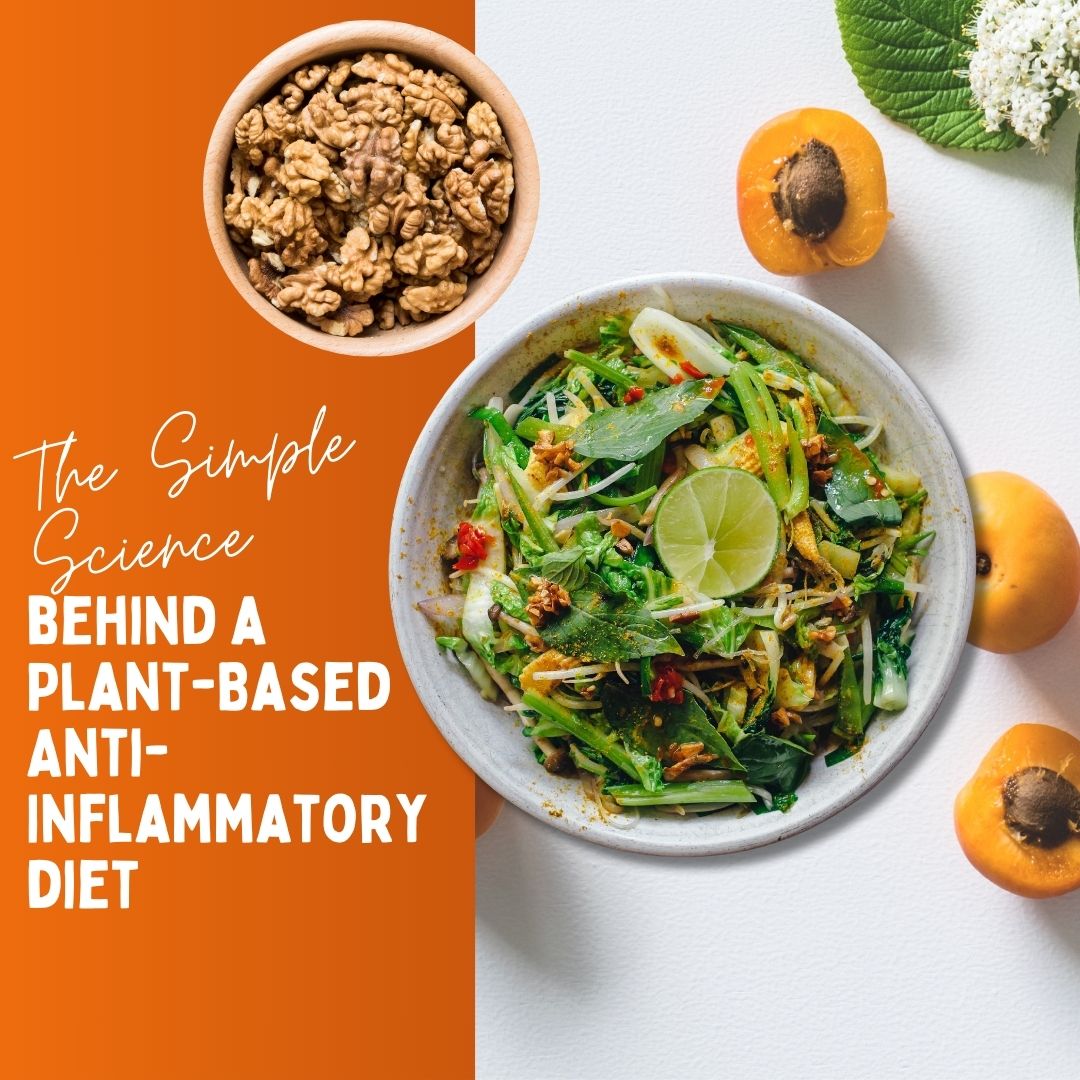Have you ever felt achy joints, unexplained fatigue, or digestive discomfort that just won’t go away? These can sometimes be signs of chronic inflammation – a hidden process in the body that goes far beyond a sprained ankle or a small infection. While inflammation is the body’s natural defense against harm, long-term inflammation has been linked to conditions like heart disease, arthritis, diabetes, and even certain cancers. The good news is that food plays a powerful role in calming inflammation. A plant-based anti-inflammatory diet is one of the most effective ways to support the body’s healing process, reduce the risk of chronic disease, and feel better day to day.
Scientific evidence supports this approach – for example, the Forks Over Knives article HOW TO REDUCE INFLAMMATION WITH A PLANT-BASED DIET explores how diet choices influence inflammatory markers in the body. The information shared here is based on widely available research and general knowledge about plant-based nutrition, but it should not replace medical advice. For personalized guidance, consult a qualified healthcare professional.
What Is a Plant-Based Anti-Inflammatory Diet?
A plant-based anti-inflammatory diet focuses on whole, minimally processed foods that naturally calm inflammation in the body. It emphasizes fruits, vegetables, legumes, whole grains, nuts, seeds, and healthy fats like those in avocados and olive oil. These foods are packed with antioxidants, fiber, and essential nutrients that fight oxidative stress and help the immune system function properly. By avoiding animal products, processed foods, and refined sugars, this way of eating helps reduce chronic inflammation, support energy, and promote long-term health.
How Do You Know if You’re Inflamed?
Chronic inflammation isn’t always as obvious as swelling or redness from an injury. It can show up in subtle ways that are easy to overlook. Some common symptoms include:
- Persistent fatigue or low energy
- Joint pain and stiffness
- Digestive issues such as bloating or gas
- Skin flare-ups like eczema or rashes
- Brain fog or difficulty focusing
These symptoms can have many causes, but when they persist over time, they may be connected to ongoing inflammation in the body.
Foods That Increase Inflammation
Certain foods can trigger or worsen inflammation, especially when eaten regularly. Common culprits include:
- Refined carbohydrates: White bread, pastries, and other refined grains that spike blood sugar and insulin.
- Fried and processed foods: Trans fats and hydrogenated oils in foods like French fries, fast food, and packaged snacks.
- Red and processed meats: High in saturated fats and preservatives, which can provoke inflammatory responses.
- Excessive sugar: Soda, candy, and sugary beverages that raise insulin and fuel inflammation.
- Alcohol: Chronic alcohol use, particularly affecting the liver.
Foods That Help Fight Inflammation
One of the best things about a plant-based anti-inflammatory diet is that it’s filled with foods that naturally help reduce inflammation and support healing. Many of these are STAPLES & ESSENTIALS in a plant-based kitchen:
- Leafy greens: Spinach, kale, and Swiss chard, rich in antioxidants and compounds that lower inflammation.
- Berries: Blueberries, strawberries, and blackberries, packed with anthocyanins that reduce inflammatory markers.
- Nuts and seeds: Walnuts, flaxseeds, and chia seeds, excellent sources of omega-3 fatty acids.
- Olive oil: Extra-virgin olive oil, high in healthy fats and oleocanthal, a compound with ibuprofen-like effects.
- Turmeric: Curcumin, the active compound in turmeric, shown to significantly lower inflammation.
- Whole grains: Oats, quinoa, and brown rice, rich in fiber that supports gut health and reduces inflammatory responses.
Can You Test for Inflammation?
Yes. Doctors can order blood tests to check for markers of inflammation. The most common is C-reactive protein (CRP), which rises when there’s systemic inflammation and has been linked to higher risks of heart disease and diabetes. Another test is the erythrocyte sedimentation rate (ESR), which measures how quickly red blood cells settle in a test tube, higher rates suggest inflammation. Other markers, such as fibrinogen and interleukin-6 (IL-6), can also provide insights. If you’re concerned about chronic inflammation, your healthcare provider can recommend the most appropriate test.
Does a Plant-Based Anti-Inflammatory Diet Really Work?
Although the term “anti-inflammatory diet” may sound trendy, there’s significant scientific evidence showing the benefits of eating this way. Studies link plant-based foods high in antioxidants and phytonutrients with reduced levels of CRP and other inflammatory markers. Cultures that eat largely plant-based diets, such as those in the Blue Zones, tend to have lower rates of chronic disease and longer lifespans. This points to the real, long-lasting impact of a plant-based anti-inflammatory diet on both health and longevity.
How to Start a Plant-Based Anti-Inflammatory Diet
Getting started doesn’t have to feel overwhelming. Think of it as making small, consistent swaps that add up over time. Here are a few simple ways to begin:
- Fill half your plate with colorful produce: Add berries to oatmeal, enjoy a big green salad at lunch, or roast sweet potatoes for dinner.
- Swap unhealthy fats for nourishing ones: Choose avocado, nuts, or extra-virgin olive oil instead of butter or margarine.
- Choose whole grains over refined carbs: Opt for brown rice, quinoa, or oats instead of white bread, white rice, or sugary cereal.
- Spice up your meals: Use turmeric, ginger, garlic, or cinnamon for both flavor and anti-inflammatory benefits.
- Stay hydrated: Drinking plenty of water helps flush out toxins and keeps inflammation in check.
Even one or two changes per week can make a noticeable difference. Over time, these small adjustments create a foundation for lasting health and energy.
Final Thoughts: Reducing Inflammation with a Plant-Based Anti-Inflammatory Diet
Chronic inflammation plays a role in many of today’s most common diseases, but diet offers a powerful way to manage it. Focusing on whole, unprocessed, plant-based foods rich in antioxidants and healthy fats helps lower inflammation and supports the body’s natural defenses. Research highlighted by Forks Over Knives shows that eating this way can lower inflammatory markers like CRP while avoiding triggers commonly found in animal products and processed foods.
You don’t need to overhaul your diet overnight. Start with simple swaps, build momentum, and enjoy the benefits of reduced inflammation, improved energy, and long-term health. A plant-based anti-inflammatory diet is more than just a trend, it’s a sustainable path to a healthier, more vibrant life.






